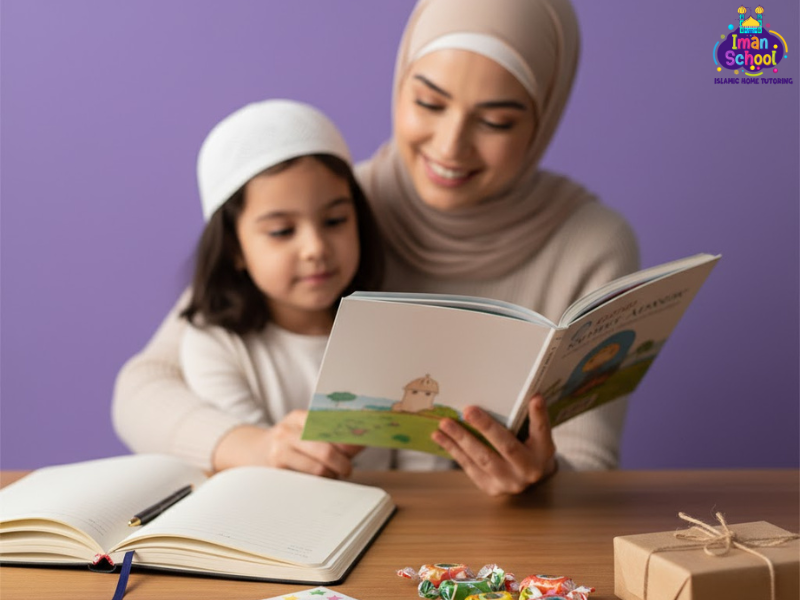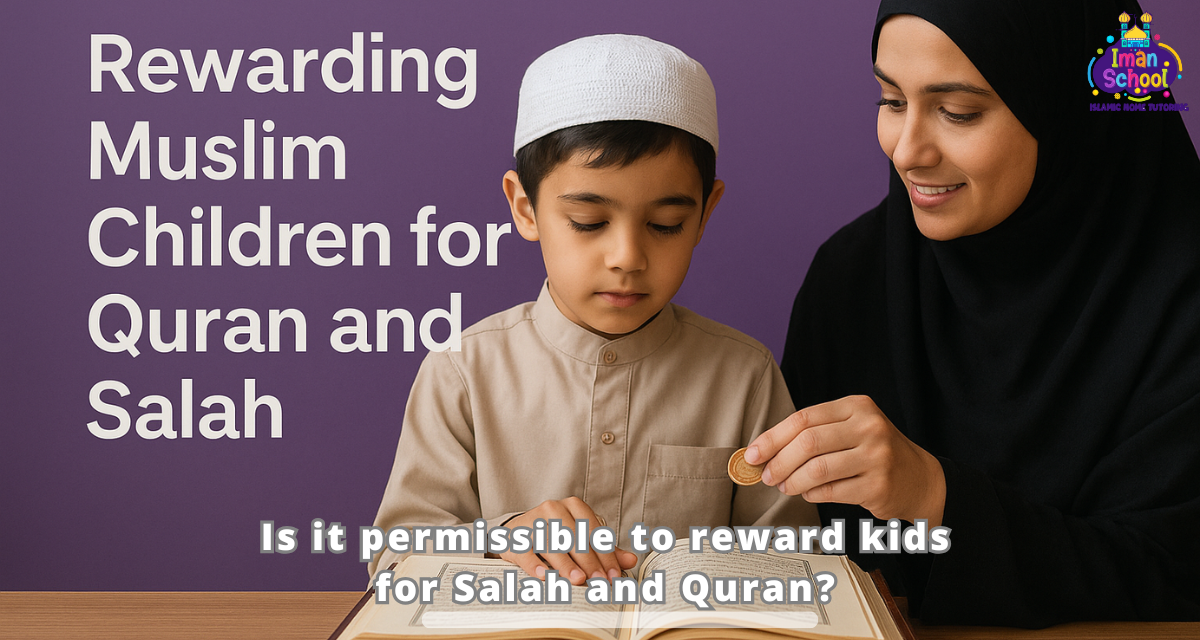One of the most profound tasks of Islamic parenting in non-Muslim countries is nurturing a love for worship in our children. While the ultimate reward (Thawab) comes from Allah, the early years often require encouragement and positive reinforcement. Parents frequently ask, "What is the best way of Rewarding Muslim Children for Quran and Salah without turning worship into a transaction?" The goal is to establish a strong, positive association with faith that ultimately leads to devotion.
What is the Islamic view on rewarding children for worship?
The Islamic view supports encouraging children toward goodness. The Prophet Muhammad (PBUH) encouraged the Sahaba (Companions) to motivate children and show kindness. Rewarding Muslim Children for Quran and Salah is seen as a form of Islamic positive reinforcement parenting, aligning with the principle of guiding children gently before the age of accountability. It’s an essential part of raising righteous children tips.
Does rewarding children for Salah count as bribery?
No, when done correctly, it does not count as bribery. Bribery is used to coerce someone to do something they shouldn't do. Rewarding is used to encourage a child toward a long-term beneficial behavior (worship) before it becomes mandatory. It's a stepping stone to how to encourage child to love Salah. The focus should quickly shift to teaching kids about Thawab (reward) from Allah, the true and eternal incentive.
How do I start Rewarding Muslim Children for Quran and Salah?
Start small and make it visual. The initial focus should be on creating a positive habit.
-
Introduce a Salah Chart effectively for children: Use a DIY Salah tracking chart where the child places stickers or draws stars for completed prayers.
-
Verbal Praise: Start every reward cycle with sincere verbal praise, celebrating their effort and consistency.
-
Small, Immediate Rewards: Link the completion of the chart (e.g., a week's worth of consistent prayer) to a small, non-material reward.
Read more: Raising Muslim Children in the West
At what age should I start rewarding my child for prayer?
The optimal time to start establishing the habit of Salah is around age seven. This aligns with the Prophetic advice to command children to pray at this age. Therefore, this is the perfect time to start Rewarding Muslim Children for Quran and Salah and utilize a Salah reward chart ideas system.

Is verbal praise better than material gifts?
Yes, verbal praise and non-material rewards are generally more effective in the long term than expensive material gifts. Sincere praise reinforces the child's self-worth and sense of accomplishment, strengthening the internal motivation needed for an Islamic reward system at home. Material gifts can inadvertently teach the child that the value of the act is equivalent to the cost of the toy.
What are non-monetary ways of Rewarding Muslim Children for Quran?
The goal is to provide non-material rewards for Muslim kids that enhance their relationship with their parents and their environment, reinforcing children’s Quran memorization challenge efforts.
-
Experience Rewards: A trip to the zoo, a picnic, a late movie night, or an extra half-hour of screen time.
-
Time Rewards: One-on-one time with a parent doing an activity of their choice (e.g., building a Lego set, reading a story).
-
Privilege Rewards: Getting to choose the family meal for the night, or picking the next activity for the family outing.
-
Recognition: Creating a beautiful certificate or announcing their achievement to the family.
Learn more: Easy Quran Surahs for Salah
How can I make Salah fun for my 7-year-old?
To make praying fun for kids and counteract the feeling of obligation, incorporate joy and meaning:
-
Special Clothes: Let them choose their own special prayer mat and beautiful, comfortable prayer clothes.
-
Lead the Prayer: Let them lead a voluntary two-unit Salah (Nawafil) with family, giving them a sense of importance.
-
Physical Space: Designate a special, clean, and decorated corner in the home as the "Prayer Station."
Read more: Learn Quran for Kids
What specific rewards work best for Quran memorization (Hifz)?
Hifz motivation for kids should be linked to their effort and the achievement of milestones.
-
Milestone Rewards: A reward for completing easy surahs to memorize for beginners (like the last ten Surahs), a Juz' (section), or reaching the halfway point.
-
Islamic Toys: Giving best toys for Muslim children rewards such as Islamic learning games, a mini-Ka'bah building block set, or books about the Prophets.
-
Public Recognition: Hosting a small party to celebrate the completion of a Juz' and inviting close family members.
Should I reward consistency or completion?
When starting an Islamic reward system at home, you should reward consistency first. Getting up for Fajr daily or sitting still through all five daily prayers for a full week is a massive step. Once consistency is ingrained, you can reward completion, such as memorizing the full Surah or reciting with proper Tajweed.
Discover now: How Do You Perform Wudu
How do I teach my child the real reward (Thawab) from Allah?
The shift from material reward to eternal reward is crucial.
-
Connect Rewards to Jannah: When giving a reward, say, "This toy is a small reward from Mommy/Daddy, but your big, beautiful reward (Thawab) is being close to Allah and earning a special house in Jannah."
-
Use Stories: Tell stories of the Prophet (PBUH) where a small good deed led to a huge blessing from Allah. This instills the true teaching kids about Thawab (reward).
-
Dua for Thawab: Teach them to make Dua after prayer, asking Allah for the true reward in the Hereafter.
How to connect Salah rewards to real-life ethics?
Integrate the spiritual lesson into the reward. For instance, if they successfully tracked their Salah for a week, you can reward them by having the family volunteer at a food bank, explaining that: "Our Salah made us strong, and now we use that strength to help others, which is the Sunnah of the Prophet." This links the ritual of Salah to the ethics of good character.

Find out more: Teaching Children to Speak the Truth
When should I stop Rewarding Muslim Children for Quran and Salah?
The time to stop reliance on external rewards is when the child reaches the age of accountability (puberty). At this point, the reward system should gradually transition from physical gifts to emphasis on intrinsic motivation and the spiritual benefits. The shift should be gradual, perhaps reducing material rewards at age ten and emphasizing spiritual consequences by age twelve.
What common mistakes should I avoid when Rewarding Muslim Children for Quran and Salah?
Avoid these common pitfalls in your Islamic parenting tips motivation:
-
Punishing Failure: Never punish a missed prayer or a mistake in recitation. This creates resentment.
-
Comparing Children: Never compare your child's progress (or lack thereof) with a sibling or friend.
-
Using Prayer as a Bargaining Chip: Do not say, "If you pray, I will let you go to the park." Prayer is a duty to Allah.
-
Monetary Overload: Avoid making cash the primary reward, as this reduces the act to a transactional job.
Rewarding Muslim Children for Quran and Salah Ideas
- Let your child earn a star or sticker each time they pray or recite Quran, and give a small reward after collecting a certain number.
- Create a point system where they earn “Jannah Points” for every good deed, which they can exchange for a gift or special privilege.
- After prayer or Quran recitation, reward them with an inspiring Islamic story to strengthen faith and values.
- If they stay consistent all week, make Friday special with a family outing or their favorite dessert.
- Design a “Quran Hero” or “Salah Superstar” certificate every month to celebrate their progress.
- Offer extra time for drawing, crafting, or Lego as a reward for completing their prayers or Quran lesson.
- Take them to the mosque for Salah, then enjoy ice cream or park time afterward, linking joy with worship.
- Show verbal appreciation like “MashaAllah, Allah loves your effort!” and make a special dua for them.
- Allow some screen time with fun Islamic learning apps that teach Quran, Salah, or Arabic.
- Encourage them to write or decorate their own “Dua Book,” rewarding them for each new dua they memorize or use in prayer.
Explore now: How To Become A Better Muslim
FAQs about Rewarding Muslim Children for Quran and Salah
What do I do if my child refuses to pray even after rewards?
If your child refuses to pray even after a positive prayer incentive system Islam, examine the environment. Are they struggling with Wudu? Do they feel overwhelmed? The last resort is mild, non-physical discipline (like limiting a privilege) near the age of ten, as advised in the Hadith for establishing the prayer. This addresses how to get kids to pray without forcing.
Is it better to reward daily Salah or weekly consistency?
It is better to acknowledge the daily effort with verbal praise but to reserve the material reward for weekly consistency or the completion of the Salah reward chart ideas. This teaches perseverance and long-term goal setting.
Can I give cash or is that considered haram for religious duties?
Giving cash is not Haram. However, for Rewarding Muslim Children for Quran and Salah, it is generally recommended to use non-monetary or experience-based rewards to avoid commercializing the act of worship.
How do I keep my teenager motivated for Quran revision?
For teenagers, shift the focus from material rewards to intellectual rewards: allow them to teach a younger sibling, discuss the meaning of the verses (Tafsir), or use their knowledge to lead prayers in a family gathering. This fulfills their need for competence and leadership.
When does a child legally have to start praying (Wajib)?
The obligation (Wajib) for Salah begins when the child reaches puberty (the age of accountability), which is typically between 10 and 15 years old. This is when the child's deeds begin to be recorded by the angels.
Check it out: Tashahhud in Prayer
The Foundation for Lifelong Devotion
Perfecting the art of Rewarding Muslim Children for Quran and Salah requires knowledge of both child psychology and Islamic ethics. Moving beyond stickers and toys, you need a structured method to instill a love for Allah's commands.
Iman School is a trusted online islamic academy offering specialized courses in:
-
Islamic Parenting and Child Development
-
Adab and Akhlaq (Prophetic Manners)
-
Foundational Islamic Studies for Kids
Enroll in Iman School today to learn proven, faith-based techniques for motivating kids to pray Islam and building a generation that loves its faith.




